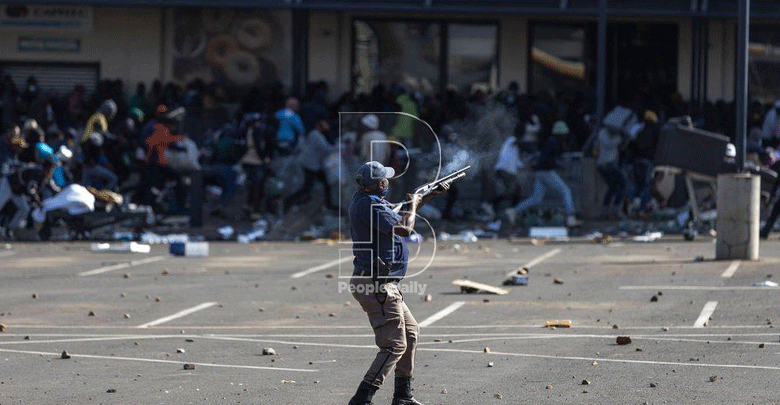Death, chaos in wake of South Africa riots

The death toll in South Africa has risen to 72 as violence continues across the country following the jailing of former President Jacob Zuma.
Crowds looting and setting alight shopping centres clashed with police in several cities on Tuesday.
The BBC filmed a baby being thrown from a building in Durban that was on fire after ground-floor shops were looted.
A day earlier, 10 people were killed in a stampede during looting at a shopping centre in Soweto.
The military have been deployed to help police overstretched since the unrest began last week.
South African police said in a statement they had identified 12 people suspected of provoking the riots, and that a total of 1,234 people had been arrested.
President Cyril Ramaphosa has called it some of the worst violence witnessed in South Africa since the 1990s, before the end of apartheid, with fires started, highways blocked and businesses and warehouses looted in major cities and small towns in KwaZulu-Natal and Gauteng provinces.
Ministers have warned that if looting continues, there is a risk areas could run out of basic food supplies soon - but have ruled out declaring a state of emergency.
The baby was caught by a crowd of people who rushed to help those trapped in the apartment block in the central business district of Durban, a coastal city in KwaZulu-Natal, on Tuesday afternoon.
Those stealing from shops on the ground floor of Smith Street had started the fire which spread, affecting those living upstairs.

The BBC’s Nomsa Maseko in Durban says that after catching the baby, the passers-by and neighbours rushed to get ladders to help other residents, including children, escape.
The mother was reunited with her baby, but was too emotional to talk. The rescue services arrived after about 20 minutes to help douse the fires.
Shopping malls
More than 200 shopping malls had been looted by Monday afternoon, Bloomberg news agency quoted the chief executive officer of Business Leadership South Africa, Busisiwe Mavuso, as saying.
Several shopping centres in Soweto - South Africa’s largest township which was once home to Nelson Mandela - have been completely ransacked, with ATMs broken into, restaurants, stores selling alcohol and clothing shops all left in tatters.
Soldiers working with the police managed to catch a few rioters; in total almost 800 have been arrested, but law enforcement remains heavily outnumbered, he reports.
In KwaZulu-Natal - where livestock has also been stolen - the unrest continues with ambulances coming under attack by rioters in some areas, South Africa’s TimesLive news site reports.
The catalyst was the arrest last week of Zuma, with his supporters blockading major roads - the economic arteries of the nation - as they demanded the release of their political hero.
Low income levels and unemployment - standing at a record high of 32.6% among the workforce and even higher at 46.3% among young people - are seen as the ticking bombs that have exploded.
Many South Africans have been shaken by the riots that have swept through Zuma’s political heartland of KwaZulu-Natal and the economic hub of Gauteng.
And many feel that his successor as president, Ramaphosa, has failed to provide decisive leadership - either to calm anger over Zuma’s imprisonment or to reassure South Africans that they will be safe.
Ramaphosa was accused of belatedly deploying troops - and only 2,500 of them compared with the 70,000 he deployed to enforce a nationwide lockdown to curb the spread of Covid-19 last year.
But there is no agreement over the deployment - the Economic Freedom Fighters (EFF) opposition party has opposed it, saying the solution lies in “political intervention and engagement with our people”.
Many residents in affected areas have remained at home, and some have formed what local media call “defence squads” to protect their neighbourhoods and businesses as looting and burning continues.
There is no doubt that the unrest is the biggest security challenge that Ramaphosa has faced since he became president in 2018 after ousting Zuma.
It is bound to worsen the economic crisis, already hit by the pandemic, given the scale of destruction.
Officials - all the way up to President Ramaphosa - have all suggested the protests were hijacked by criminal elements.
Others believe the hardships exacerbated by the coronavirus pandemic created a tinderbox which just needed a spark to set it alight. The spark, in this case, was jailing Ramaphosa’s predecessor for contempt of court.
“We knew, when we locked down again, this was bound to happen, because the longer you leave people hungry, these events would take place,” Eldrin Naidoo told the BBC from Johannesburg.


